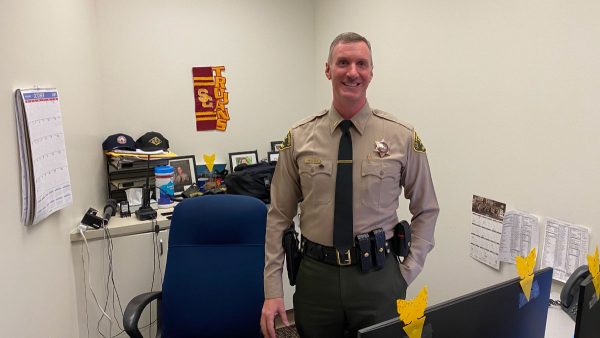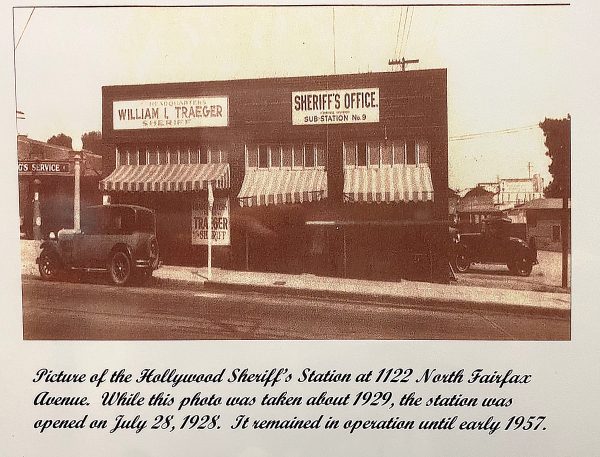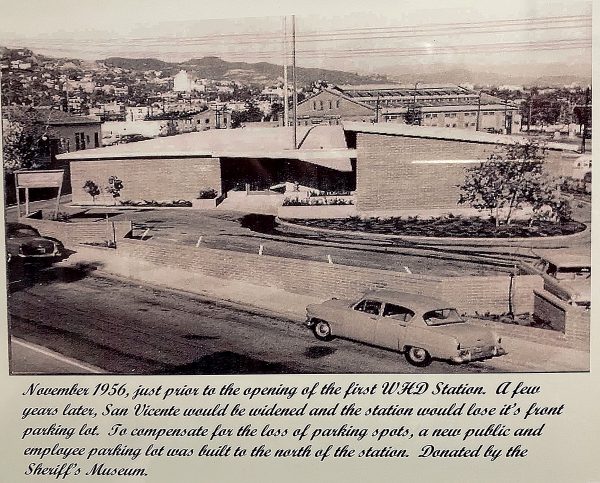
Hello Lieutenant Bill Moulder, thank you so much for your time.
Hi Larry, it’s great to have you here.
Let’s start off with you. Where were you born, where did you grow up?
I was actually born here in Los Angeles in the San Fernando Valley and spent my formative years in La Crescenta, which is near Glendale. That’s kind of where I developed my interest in joining the sheriff’s department. A lot of my friends were interested in law enforcement. I had friends that went to LAPD, Glendale Police Department and Sheriffs Dept. I went on my first ride-along in a police car at 16 years old at the Center Valley Sheriff Station.
Where do you live now?
I live in Santa Clarita and have been in the Santa Clarita Valley for about about 30 years — a long time.
How did you get to West Hollywood Station?
At the L.A. County Sheriff’s Department, you have to work Custody before you go to patrol, so I worked Custody. I then worked Court Services, then to Patrol. I served at the Lancaster sheriff’s station and also Palmdale. I worked both stations up there in training for about three years and then transferred here to West Hollywood. I was here for about two months and then requested a leave of absence. They denied the leave of absence so I ended up quitting. I wanted to travel and went to Europe for seven months. When I came back and got my job back with the Sheriff, I worked custody for a short period of time and then came back to West Hollywood in 2002. That’s a long setup. So I was here in 2002 as a deputy, I was a training officer here and was also a detective here then moved on to some other units. I was promoted and then came back here as a Lieutenant in the end of 2018.
What’s the difference between a Captain, a Lieutenant and a Sergeant?
We are all deputy sheriffs but then we have then different ranking structures within deputy sheriffs. There’s a “deputy sheriff generalists,” which most patrol deputies are; then you can be a “bonus one” and or a “bonus two,” which you get additional pay, and you have additional responsibilities such as supervision or specialized units like Homicide or the Special Enforcement Bureau. A Sergeant is the next step on the ladder of promotion. Sergeants generally are supervisors in our department and supervise the deputy personnel. A Lieutenant is considered a manager and they kind of fulfill more of a management role overseeing different parts of our operation here at the station. Then there is the Captain, which is an an executive role in our department. Captains and above are picked by the Sheriff himself and they manage the stations.

We had a few of questions from the public regarding the Ramirez interview so let’s run them first. What is the percentage of the officers here at the West Hollywood Station that are vaccinated?
I don’t know the exact percentage; however, all the L.A. County employees will have a system that everybody’s going on to put in their status whether they’re vaccinated or if they’re not vaccinated, or if they have a medical exemption or other religious or any kind of other exemption, they can then put that information in too. The deadline, I think, just passed for that, so at some point the County will be able to identify percentages of vaccinated employees within Los Angeles County and the specific departments including the Sheriff’s Department.
Is there an hourly starting rate for deputy sheriffs, and are there any opportunities open in West Hollywood station?
On the department as a whole, currently, because of budget restrictions and funding, I don’t believe we’re hiring deputy sheriffs at the moment — in terms of new deputy sheriff trainees that we have to put through our academy.
I believe the department is hiring lateral people that are already trained and California peace officers that work at a different agency. Starting salary, I don’t have it off the top of my head, but there is information on the website that indicates what is a deputy sheriff’s general starting wage.
Another question asked by the public was about the rainbow logo on the side of the sheriff cars. Is that something that we actively have and can continue to maintain or is that an old program?
No, we still have it and we actively maintain it. Actually not long ago we got a set of new vehicles, so we had some new stickers produced and placed them on the vehicles. We’re still in the process of outfitting all of them but they will all have the rainbow on them.
Is there a general plan every day of how many deputies are deployed at any given time? How many officers on the staff and how are they spread throughout the city?
We break the day into three different shifts: an early morning shift which is overnight; the day shift during the day; and a P.M. shift with day into the evening hours. We even have overlap which are different hours within day and early morning. But, generally, we have anywhere from seven units in the early morning to eight during the day and seven in the P.M. We work 10-hour schedules which may overlap. It depends on what time of the day — but also we have the COPS team, which is five deputies, and they usually are on day shift. And we also have the entertainment policing team, which is in the evenings to the early hours of the morning. They handle all the bars, clubs and restaurants, and there are four deputies on that team. During the day we have additional staffing here — all of our detective bureau is here during the weekdays. So we have 10 to 12 detectives and some sergeants, then additional staffing like myself and our operations people that work the desk. All sworn in individuals.
On that staffing three shifts, does one of those shifts end at 2 a.m or midnight? Because there’s a change in the deputies in the middle of the peak hours. I’m curious when that nighttime shift ends?
So we have a shift that starts at 4 P.M. and then that’s our P.M. shift, then our early morning shift starts at 8 p.m and they go 10 hours, so 4 A.M. I’m a little slow on the math but if it’s the 2 A.M., so yes, that’s when they end. But then you’ll have the early mornings from 8 P.M. to 6 A.M. shift.
If they’re off at 2 A.M. and there’s all this activity in town are they often planned or getting overtime and staying later to patrol?
Sometimes if we need additional people on, then yes, we’ll hold them. We’ll hold people over from the P.M. shift to take care of various things that we might need to take care of — if there’s a critical incident, or anything like that. But usually we have the early morning shift, and then we’ll also have the entertainment policing team, and they’re off at 4 A.M. So we always kind of have additional people here into the late hours of the night and early hours of the morning.
The West Hollywood Sheriff Station covers what total area?
West Hollywood’s Sheriff’s Station is responsible for patrol for the City of West Hollywood and the unincorporated area of Los Angeles County — Universal, Franklin Canyon, and the Federal Enclave.

I think we’re going to end this section with one last question: Where is the pain in your job?
The pain in my job — I don’t know that there’s any necessarily pain in my job. I think there’s challenges that we have. Captain Ramirez, in your talk with him, mentioned probably the hardest issue to deal with is the issue regarding people experiencing homelessness, and you know, that’s an umbrella, because you have people that are having problems on the street and that are on the street and they need help and they need assistance, then there’s people that have mental health issues, there’s people that have substance-use disorder and then some of those then overlap. And then there’s a section under all of that that we have people that are unhoused on the streets that are committing crimes and committing the quality-of-life problems that you know through your reporting and that we hear from the community. And those are a difficult problem to address because it’s going to take more than just law enforcement to address them. The City of West Hollywood is fantastic. They’ve always been a leader and always been progressive in how they how they deal with these kinds of issues. And they have a wonderful Social Services Division with a lot of great people. There are great contracts they’ve set up with Tarzana Treatment Center with a Step Up on second and other organizations to come out and help people in need, unhoused people in our community. And also the City of West Hollywood being the pioneer that it is, they are the first contract city a city that contracts with the Los Angeles County Sheriff’s Department in the county to have a dedicated M.E.T. team, which is our Mental Health Evaluation Team and i’m sure you’re familiar with that. It’s a deputy with almost 1,000 additional hours of mental health training and a clinician from the Los Angeles County Department of Mental Health, and they’re teamed up, they wear “soft” clothing, not not a uniform-type of clothing. They’re in a white SUV, and they go out and they they do wonderful work. So all these different things the city and the sheriff has done to try to address this problem, but it’s certainly a bigger problem than than us, and it’s going to take some additional steps with the state government to help us out with maybe law changes to help these people out that are on the street
So you said we we’re the only city in the contract cities to have a MET team?
he Los Angeles County Sheriff’s Department set up the MET program in the early 90s, and it’s generally a county-wide program, so whenever any of our stations need that team can call and get one. However, the MET team might be in Pico Rivera, and the deputies in Palmdale need the MET team to respond. But that’s quite a distance to travel, quite an expenditure of time, and things can change in that large amount of time pretty rapidly. We’ve been building that program out, but of course, finances restrict additional deputies and clinicians for that program.
However, the City of West Hollywood has paid for a dedicated 40-hour team that’s here during the week and only works for West Hollywood. They’ve done an incredible job. I think you might have seen some of the updates at previous Public Safety Commission meetings and City Council meetings about their work

Straight answers to questions. Very refreshing.
At the last city council meeting I met the two deputies that regularly police the meetings. I found out they aren’t full time paid deputies, but unpaid reserves who generously volunteer there time to keep regular patrol deputies on the street. I then jokingly asked if they enjoy sitting through these long laborious meetings twice a month. One of them said no comment and the other said we do it for LT. Moulder. That right there should speak volumes about him.
[…] Source link […]
Lt Moulder is community policing at its finest.
Is he gay or straight? We want to know!
why?
Do you see his name?
The Operations Lt. has perhaps the most-difficult job in a very difficult profession. Lt. Moulder has a lot of competing demands to balance, and has one hand tied behind his back due to our unwillingness to do anything about the mentally ill.
I have had the pleasure of knowing Bill for as long as he’s been at the station and we couldn’t ask for anyone more caring and responsive as he is.. He is the type of leadership the Department needs. We are so fortunate to have him here at WeHo and I hope he stays!! If Ed becomes a Commander I hope and pray Bill would be our next Captain!!! He is an exemplary example of what a peace officer should stand for.
I would second that!
The Lt. was very cooperative and helpful regarding homeless issues on Havenhurst Drive in the small Los Angeles section just south of Sunset. The totally incompetent Los Angeles city council member for that area did absolutely nothing. Which is not surprising since Mayor Garcetti, that totally incompetent fool, is being now shipped off to India. Too bad it wasn’t Bangladesh.
Five stars for Bill and the Los Angeles County Sheriff. Imagine how difficult it must be to work with the ludicrous SHE aka Shyne, Horvath and Erickson or the Misandry Three.